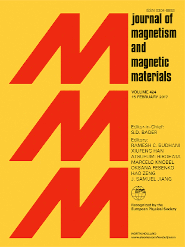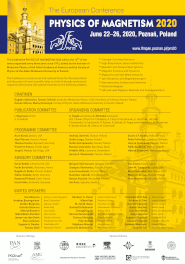
The European Conference
PHYSICS OF MAGNETISM 2020 (PM'20)
June 22-26, 2020 Poznań, POLAND
(see PM'21 website)
Abstracts
Prepare and submit your abstract
Deadline for abstract submission is March 7th, 2020.
Abstract acceptance will be published on March 22nd, 2020.
"Young and Brilliant" Session
For the first time this year, a special session for "Young and Brilliant" scientists will be organized during “The European Conference Physics of Magnetism”. It is planned to be a medium for students working towards their PhD, or recent PhD graduates who have received their degree within the last two years (not before January 1st, 2018).
Speakers of this session should be able to present novel research results, supported by publications in high impact journals. They will present their achievements in the form of invited lectures (25’ talk followed by 5’ discussion).
The selection of candidates will be conducted jointly by the Organizing Committee and the Program Committee. The decision will be based on the submitted abstract and on the scientific merits of the candidate: bibliometric parameters and recognition by the physics community. The selected speakers will be exempt from the conference fee and may apply for a refund of travel and accommodation costs.
Abstract categories
- Strongly Correlated Electrons and High Temperature Superconductivity
- Heavy fermions and Kondo systems
- Charge, orbital, and multipole orderings and excitations
- Quantum phase transitions
- Metal-insulator transitions
- Highly correlated metals and insulators
- Itinerant electron magnetism
- Organic conductors
- Low dimensional conductors
- Correlation effects in mesoscopic systems
- Multiferroics
- Quantum and Classical Spin Systems
- Low dimensional quantum magnets
- Frustrated magnets and spin liquids
- Quantum phase transitions
- Lattice effects and spin Peierls systems
- Solitons and non-linear effects
- Statistical mechanics of quantum and classical systems
- Molecular magnetism
- Quantum tunnelling and coherence
- Quantum information
- Organic and organo-metallic materials
- Magnetic Structure and Dynamics
- Crystal field and anisotropy
- Magnetic structure and spin waves
- Dynamic phenomena
- Electronic structure
- Magnetic interactions
- Rare-earth and actinide magnetism
- Transition metal alloys and compounds
- Spin glasses
- Random magnets
- Magnonic crystals
- Spin Electronics and Magneto-Transport
- Magnetoresistance effects
- Current induced magnetization reversal
- Spin injection and accumulation
- Spin Hall effect
- Magnetic semiconductors
- Optical properties
- Quantum computation
- Nanostructures, Surfaces and Interfaces
- Surfaces and interfaces
- Films, multilayers and superlattices
- Exchange interaction and anisotropy
- Spin dynamics, Patterned films
- Nanoparticles
- Nanowires and quantum dots
- Soft and Hard Magnetic Materials
- Amorphous and nanocrystalline materials
- Granular materials
- Ferrites, garnets and microwave materials
- Permanent magnets
- Magnetization processes
- Magneto-elastic and magnetostrictive materials
- Modeling and simulations
- Applications
- Magnetic sensors
- Ferromagnetic shape-memory materials
- Actuators and magnetic drives
- Magnetic refrigeration
- Magnetic fluids
- Magnetic separation and levitation
- Other Topics
- Biomagnetics
- Magnetism in medicine
- Measuring techniques and instruments
- Magnetic recording and memories


